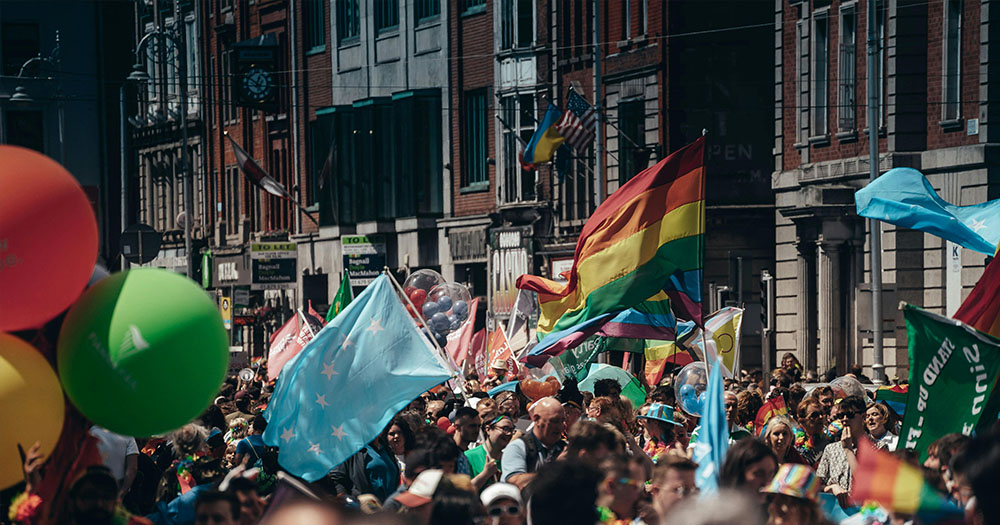When it comes to LGBTQ+ rights, it is important to recognise how far we have come and celebrate the wins our community has had. Here, we’re taking you on a whistle-stop tour of Ireland’s LGBTQ+ history, and the highs and lows we have faced along the way.
1861 – Offences Against the Persons Act
This was the first official act of the criminalisation of homosexuality in the UK and Ireland. The Offences Against the Persons Act made “buggery” a punishable offence by penal servitude which was imprisonment with hard labour.
1970s – A Social Movement
At this time, there was a cultural shift in the world as homosexuality in many other countries was becoming decriminalised. One of the people who pushed for this change in Ireland was David Norris, a lecturer at Trinity College Dublin. He was one of the founding members of the Sexual Liberation Movement and ran a campaign for Homosexual Law Reform, which aimed to legalise homosexuality in the Republic of Ireland and Northern Ireland.
In 1977, Norris brought the issue to court, stating that the law went against the Irish Constitution’s position on privacy. It was brought to the High Court and Supreme Court but was defeated both times.
1980s – First Pride Parade
On September 10, 1982, Declan Flynn was attacked at Dublin’s Fairview Park and was tragically killed. The five men responsible were brought before the court, where Justice Sean Gannon gave them a suspended sentence for manslaughter.
This sparked outrage within the LGBTQ+ community and the first Pride parade in Ireland’s history was held in March 1983 to protest the violence that LGBTQ+ people were facing.
In 1988, David Norris’ case was heard by the European Court of Human Rights. They found that Ireland’s law had breached the rules of the European Convention on Human Rights, paving the way for decriminalisation.
1990s – The Decriminalisation of Homosexuality
After 132 years, on June 24, 1993, homosexuality was decriminalised in Ireland. The Criminal Law (Sexual Offences) Act, 1993 was passed by then Fianna Fáil TD and the Minister for Justice Máire Geoghan-Quinn. This removed laws from the Constitution which criminalised sex acts between men.
2010s – A Time of Change
In 2010, the Civil Partnership Act was passed, granting same-sex couples some of the same rights as heterosexual married couples. However, there were still laws against the guardianship of children, adoption, custody, access and maintenance.
In 2011, the first three openly LGBTQ+ TDs were elected to the Dáil, Jerry Buttimer, John Lyons and Dominic Hannigan, who were the TDs for Cork South-Central, Dublin North-West and Meath East, respectively.
On May 22, 2015, the Irish public voted on same-sex marriage, with 61% of votes in favour and 38% against. Ireland was the first country to have passed same-sex marriage by popular vote. This was signed into law on October 19, 2015.
On July 15, 2015, the Gender Recognition Act was passed, making it easier for trans people in Ireland have their preferred gender legally recognised by the State.
In 2015, Tomás Henegan brought a case to court against the Irish Blood Transfusion Service to get rid of the lifelong ban on men who have sex with other men donating blood. The ban was finally lifted on January 16, 2017.
2020s – The Fight Persists
The Children and Family Relationship Act of 2015 was enacted in 2020. Niamh O’Sullivan and Geraldine Rea were the first same-sex couple in Ireland to have both their names registered on the official birth certificates of twin girls.
On December 31, 2024, the long-awaited Criminal Justice (Hate Offences) Act 2024 came into force, providing increased prison sentences for certain crimes proven to be motivated by hatred based on a person’s protected characteristics, which include sexual orientation and gender identity. Hate speech provisions were removed from the Act, with campaigners continuing to advocate for updated laws.
It has been a long and trying journey for LGBTQ+ people throughout Ireland’s history but there have been many positive changes in favour of our community. It is important to continue learning about our pest and recognise those who paved the way and made change happen.
© 2025 GCN (Gay Community News). All rights reserved.
Support GCN
GCN is a free, vital resource for Ireland’s LGBTQ+ community since 1988.
GCN is a trading name of National LGBT Federation CLG, a registered charity - Charity Number: 20034580.
GCN relies on the generous support of the community and allies to sustain the crucial work that we do. Producing GCN is costly, and, in an industry which has been hugely impacted by rising costs, we need your support to help sustain and grow this vital resource.
Supporting GCN for as little as €1.99 per month will help us continue our work as Ireland’s free, independent LGBTQ+ media.
